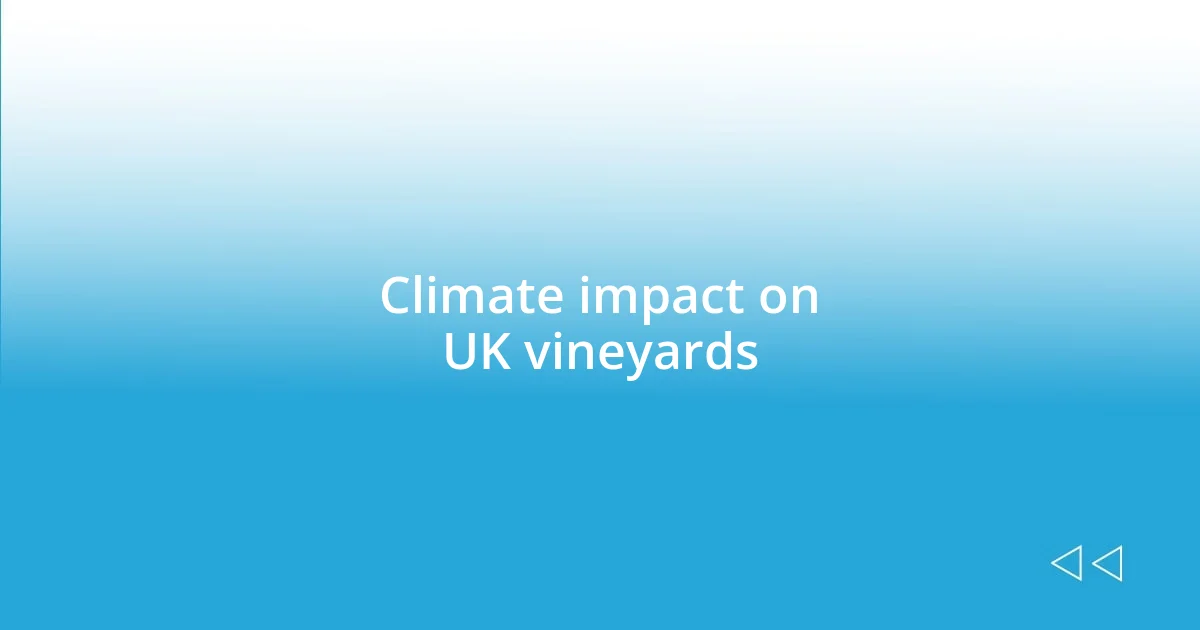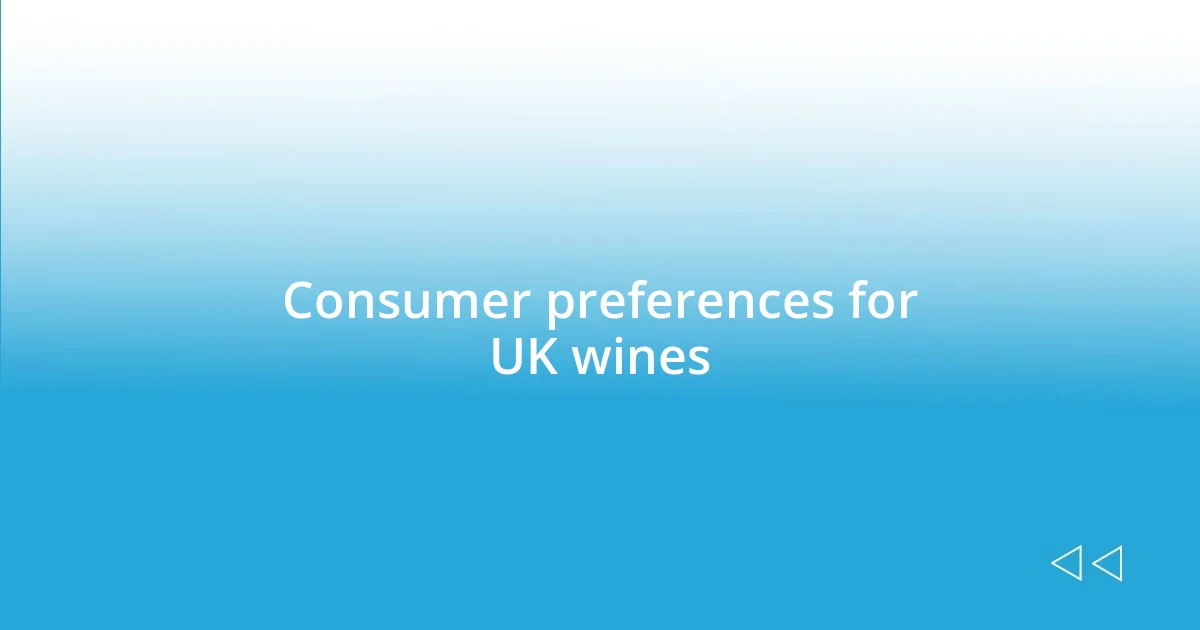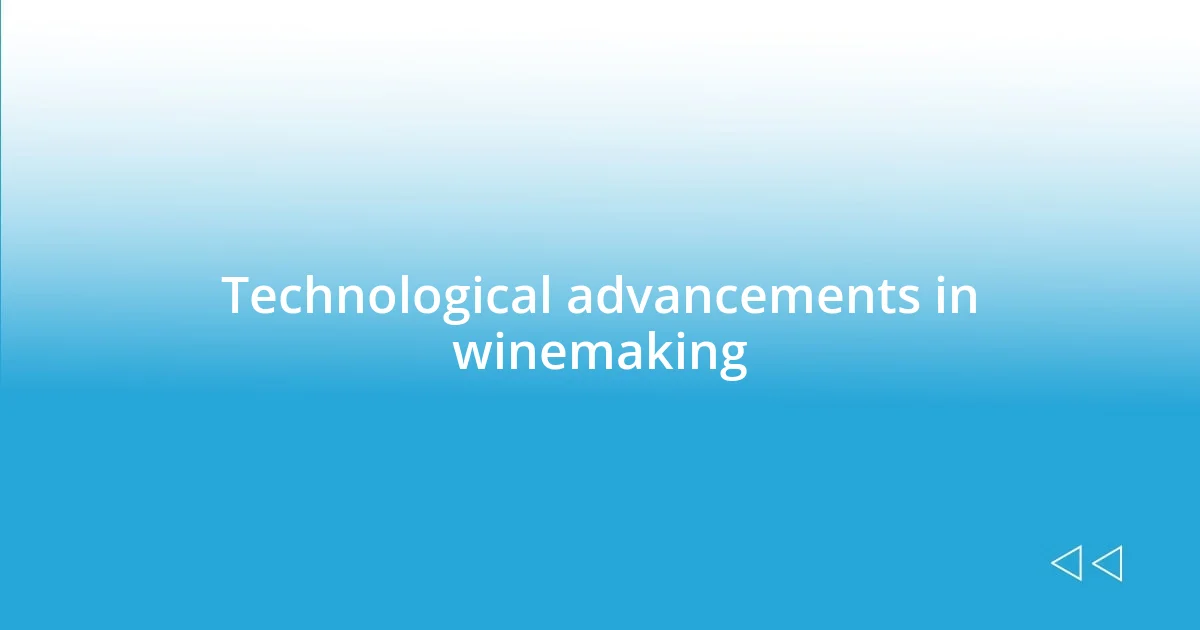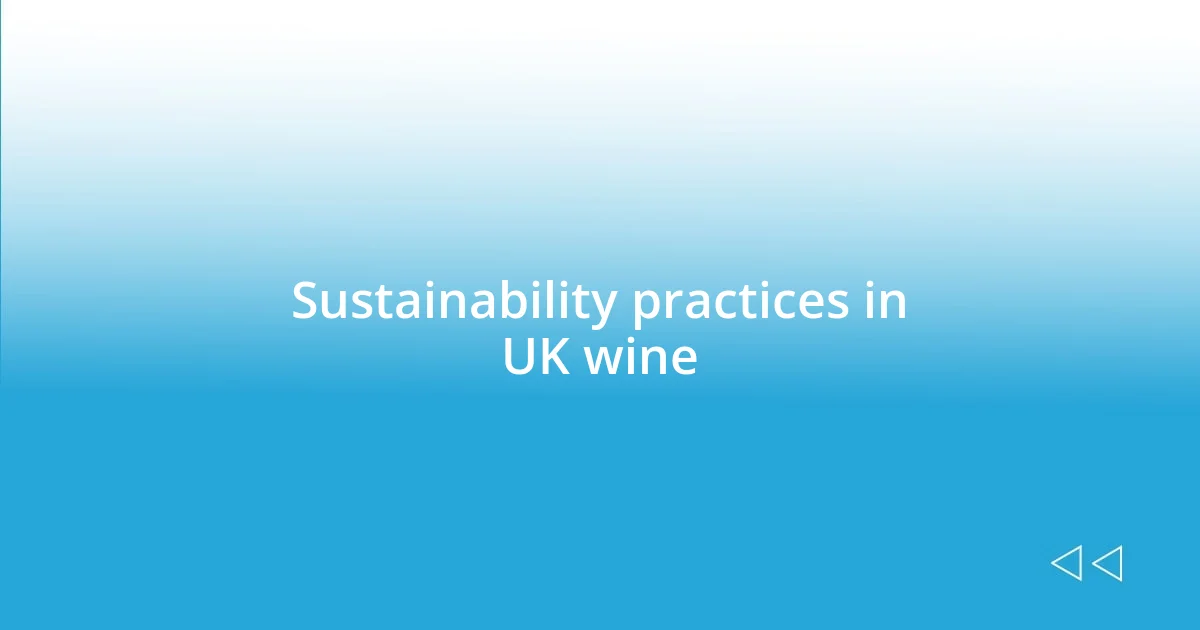Key takeaways:
- The UK wine industry is increasingly focused on sustainability, with more vineyards adopting organic and biodynamic practices.
- Consumer preferences are shifting towards wines that reflect local terroir, lower alcohol content, and sustainable production methods.
- Technological advancements, such as precision viticulture and sophisticated fermentation processes, are enhancing wine quality and efficiency in the winemaking process.

Current trends in UK wine
The UK wine scene is currently witnessing an exciting shift toward sustainability. Personally, I’ve always been passionate about environmentally-friendly practices, and it’s heartening to see more vineyards adopting organic and biodynamic methods. This trend not only appeals to eco-conscious consumers but also enhances the quality and character of the wines.
Another notable trend is the rise of sparkling wines, especially English sparkling wine, which has gained international recognition. I remember the joy I felt sipping a glass of English sparkling at a recent tasting event; it was just as delightful as its Champagne counterpart. Doesn’t it make you proud to support local producers who are putting the UK on the global wine map?
Finally, there’s a burgeoning interest in diverse grape varieties beyond the traditional choices. While classic varieties like Chardonnay and Pinot Noir remain popular, I’ve discovered some intriguing lesser-known grapes that are making their way into the market. Trying a wine made from a grape I had never heard of before was a thrilling experience—what if our next favorite wine lies in an unexpected bottle?

Climate impact on UK vineyards
The climate crisis is undeniably shaping the future of UK vineyards, influencing the types of grapes that can thrive in the warmer conditions. I often reflect on the dramatic changes I’ve witnessed over the years; I recall a recent visit to a vineyard where the owner shared how warmer summers have shifted their grape harvest by weeks, altering the entire winemaking process. It’s fascinating, yet a bit unsettling, to see such rapid changes playing out right before my eyes.
- Rising temperatures are allowing for a broader range of grape varieties to be cultivated in the UK.
- Increased rainfall and changing weather patterns can threaten grape quality and yield.
- The need for adaptive practices, like irrigation and shade management, is becoming more prevalent.
- Wine producers are increasingly investing in research to understand climate impacts and develop sustainable solutions.
As I sip a lovely glass of locally produced wine, I can’t help but think about how these changes might shape both the landscape and the flavors of the wines I love. There’s something both hopeful and challenging about navigating this new reality, where every bottle tells a story not just of place but of adaptation and resilience.

Consumer preferences for UK wines
The preferences of consumers in the UK wine market are evolving, and I find this shift incredibly fascinating. More consumers are leaning towards wines that showcase local terroir and reflect the unique characteristics of British vineyards. During a recent visit to a local wine shop, I was surprised to hear the staff enthusiastically recommending wines labeled as “” (local varietals), emphasizing how they tell a story of the region. It’s a thrilling moment to explore a wine that encapsulates its birthplace.
One striking trend is the growing demand for lower-alcohol wines. I’ve noticed that many of my friends, who once gravitated toward bold reds, are now opting for lighter options that can be enjoyed over long dinners. At a recent dinner party, we tasted a lovely English white with a crisp finish that was just under 10% alcohol. It was refreshing and perfect for sipping while enjoying good food and conversation. Doesn’t it make sense to focus on balance and moderation in our modern lifestyles?
Lastly, sustainable practices are no longer just a niche but have entered the mainstream consciousness of UK consumers. I remember researching a local vineyard known for its environmentally-friendly practices and feeling inspired by their commitment to organic farming. When I tasted their wine, I could almost feel the pride and passion of the vineyard workers bottled up within each sip. It’s clear that consumers are increasingly willing to pay a little more for wines that contribute to sustainability, making these choices feel even more rewarding.
| Consumer Preference | Characteristics |
|---|---|
| Local Terroir | Wines that reflect regional attributes |
| Lower-Alcohol Options | Lighter wines for casual sipping |
| Sustainability | Preference for organic and eco-friendly practices |

Technological advancements in winemaking
The advancements in technology are revolutionizing winemaking in the UK, and I find this shift truly exhilarating. For instance, precision viticulture allows producers to use data-driven insights to monitor vine health and optimize grape quality. I recall discussing with a vineyard manager how they’ve implemented drones to survey their fields—what an incredible way to spot issues before they become serious problems!
Additionally, fermentation technology is becoming more sophisticated, enhancing flavor extraction and consistency. I recently visited a winery that uses temperature-controlled fermentation tanks, and I was amazed at how this method can prevent unwanted flavors from developing. It’s like they’ve unlocked a secret to making each vintage taste just right. Have you ever wondered how a tiny change in temperature could influence a wine’s overall profile so dramatically?
Moreover, innovations in filtration and bottling processes are increasing efficiency while retaining the wine’s integrity. I’ve tasted several wines lately that boast a purer taste, thanks to improved techniques that minimize oxygen exposure. It’s reassuring to know that as the industry embraces new technologies, the essence of the wine remains intact while delivering delightful experiences to the consumer. What a fascinating time to explore and enjoy British wines!

Sustainability practices in UK wine
Sustainability practices in the UK wine industry are not just a trend; they are becoming a vital part of the winemaking process. The other day, while strolling through a vineyard, I noticed how they were using cover crops to enhance soil health naturally. It was inspiring to see these eco-friendly techniques in action, and it made me think: how often do we consider the land when enjoying a glass of wine?
Many winemakers are committed to organic and biodynamic methods, which prioritize the environment and the ecosystem. I once attended a tasting at a winery that proudly showcased their certification; each sip felt like partaking in a larger story of sustainability and care. It was clear to me that these practices not only benefit the planet but also enhance the wine’s flavor and character. Isn’t it fascinating how you can actually taste the care that goes into the production?
Moreover, the push for sustainable packaging is reshaping the industry landscape. I remember being pleasantly surprised when I received a wine shipment in eco-friendly materials that still felt luxurious. It forced me to reconsider my own consumption habits and how my choices can impact the environment. Isn’t it wonderful to know that every sip of wine can contribute to a greener future?














